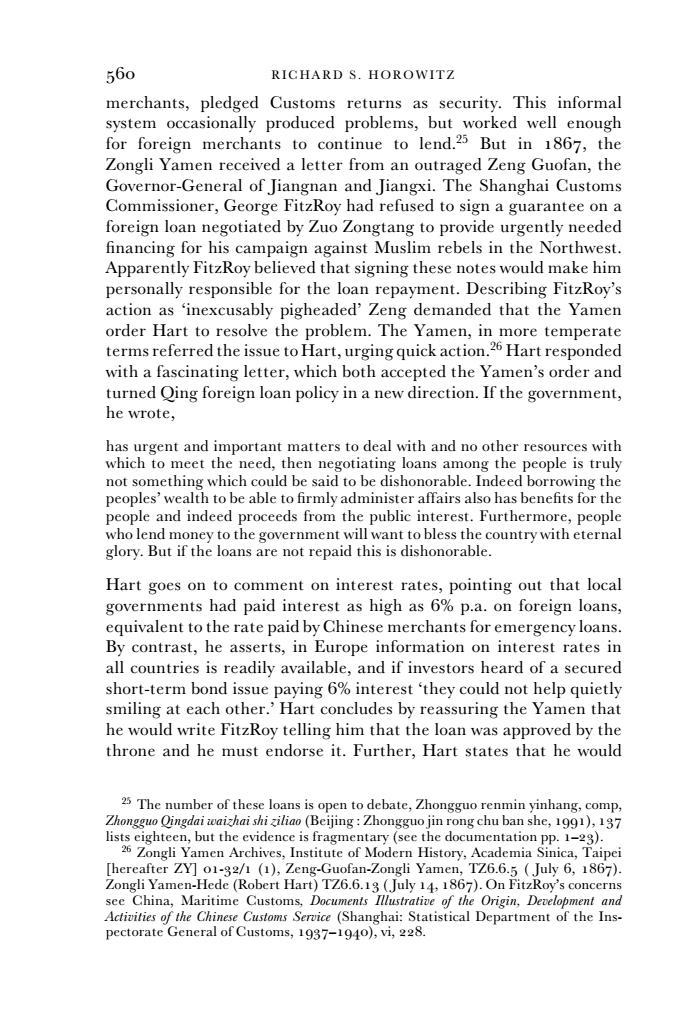正在加载图片...

560 RICHARD S.HOROWITZ merchants,pledged Customs returns as security.This informal system occasionally produced problems,but worked well enough for foreign merchants to continue to lend.25 But in 1867,the Zongli Yamen received a letter from an outraged Zeng Guofan,the Governor-General of Jiangnan and Jiangxi.The Shanghai Customs Commissioner,George FitzRoy had refused to sign a guarantee on a foreign loan negotiated by Zuo Zongtang to provide urgently needed financing for his campaign against Muslim rebels in the Northwest. Apparently FitzRoy believed that signing these notes would make him personally responsible for the loan repayment.Describing FitzRoy's action as 'inexcusably pigheaded'Zeng demanded that the Yamen order Hart to resolve the problem.The Yamen,in more temperate terms referred the issue to Hart,urging quick action.26 Hart responded with a fascinating letter,which both accepted the Yamen's order and turned Qing foreign loan policy in a new direction.If the government, he wrote, has urgent and important matters to deal with and no other resources with which to meet the need,then negotiating loans among the people is truly not something which could be said to be dishonorable.Indeed borrowing the peoples'wealth to be able to firmly administer affairs also has benefits for the people and indeed proceeds from the public interest.Furthermore,people who lend money to the government will want to bless the country with eternal glory.But if the loans are not repaid this is dishonorable. Hart goes on to comment on interest rates,pointing out that local governments had paid interest as high as 6%p.a.on foreign loans, equivalent to the rate paid by Chinese merchants for emergency loans. By contrast,he asserts,in Europe information on interest rates in all countries is readily available,and if investors heard of a secured short-term bond issue paying 6%interest they could not help quietly smiling at each other.'Hart concludes by reassuring the Yamen that he would write FitzRoy telling him that the loan was approved by the throne and he must endorse it.Further,Hart states that he would 25 The number of these loans is open to debate,Zhongguo renmin yinhang,comp, Zhongguo Qingdai waizhai shiziliao(Beijing:Zhongguo jin rong chu ban she,1991),137 lists eighteen,but the evidence is fragmentary (see the documentation pp.1-23). 26 Zongli Yamen Archives,Institute of Modern History,Academia Sinica,Taipei [hereafter ZY]01-32/1 (1),Zeng-Guofan-Zongli Yamen,TZ6.6.5 (July 6,1867). Zongli Yamen-Hede (Robert Hart)TZ6.6.13 (July 14,1867).On FitzRoy's concerns see China,Maritime Customs,Documents Illustrative of the Origin,Development and Activities of the Chinese Customs Service (Shanghai:Statistical Department of the Ins- pectorate General of Customs,1937-1940),vi,228.560 RICHARD S. HOROWITZ merchants, pledged Customs returns as security. This informal system occasionally produced problems, but worked well enough for foreign merchants to continue to lend.25 But in 1867, the Zongli Yamen received a letter from an outraged Zeng Guofan, the Governor-General of Jiangnan and Jiangxi. The Shanghai Customs Commissioner, George FitzRoy had refused to sign a guarantee on a foreign loan negotiated by Zuo Zongtang to provide urgently needed financing for his campaign against Muslim rebels in the Northwest. Apparently FitzRoy believed that signing these notes would make him personally responsible for the loan repayment. Describing FitzRoy’s action as ‘inexcusably pigheaded’ Zeng demanded that the Yamen order Hart to resolve the problem. The Yamen, in more temperate terms referred the issue to Hart, urging quick action.26 Hart responded with a fascinating letter, which both accepted the Yamen’s order and turned Qing foreign loan policy in a new direction. If the government, he wrote, has urgent and important matters to deal with and no other resources with which to meet the need, then negotiating loans among the people is truly not something which could be said to be dishonorable. Indeed borrowing the peoples’ wealth to be able to firmly administer affairs also has benefits for the people and indeed proceeds from the public interest. Furthermore, people who lend money to the government will want to bless the country with eternal glory. But if the loans are not repaid this is dishonorable. Hart goes on to comment on interest rates, pointing out that local governments had paid interest as high as 6% p.a. on foreign loans, equivalent to the rate paid by Chinese merchants for emergency loans. By contrast, he asserts, in Europe information on interest rates in all countries is readily available, and if investors heard of a secured short-term bond issue paying 6% interest ‘they could not help quietly smiling at each other.’ Hart concludes by reassuring the Yamen that he would write FitzRoy telling him that the loan was approved by the throne and he must endorse it. Further, Hart states that he would 25 The number of these loans is open to debate, Zhongguo renmin yinhang, comp, Zhongguo Qingdai waizhai shi ziliao (Beijing : Zhongguo jin rong chu ban she, 1991), 137 lists eighteen, but the evidence is fragmentary (see the documentation pp. 1–23). 26 Zongli Yamen Archives, Institute of Modern History, Academia Sinica, Taipei [hereafter ZY] 01-32/1 (1), Zeng-Guofan-Zongli Yamen, TZ6.6.5 ( July 6, 1867). Zongli Yamen-Hede (Robert Hart) TZ6.6.13 ( July 14, 1867). On FitzRoy’s concerns see China, Maritime Customs, Documents Illustrative of the Origin, Development and Activities of the Chinese Customs Service (Shanghai: Statistical Department of the Inspectorate General of Customs, 1937–1940), vi, 228